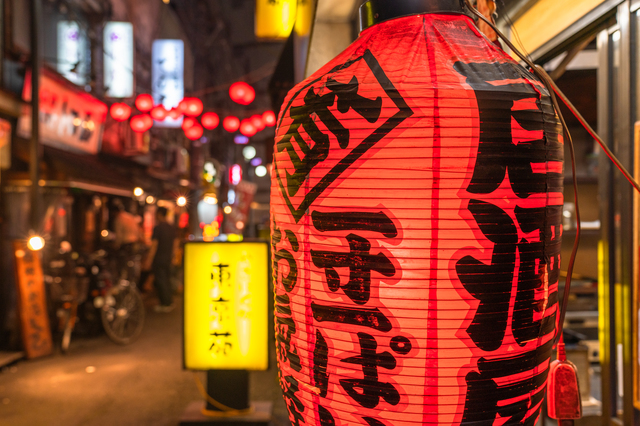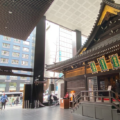My Japan Syndrome

“Aside from the Japanese loanwords, English-speaking communities in Japan also have some phrases all their own. For instance, My Japan Syndrome.” The author describes the symptoms of this “chronic disease.”
Photo: Macha / PIXTA
Speak English with a native speaker living in Japan and you’ll run across words unlikely to come up in a conversation in, say, the US or the UK. For example, the Japanese word conbini comes from the English convenience store, but I can’t recall ever hearing English speakers here using the latter to describe their local Lawson or Family Mart franchise. We drop conbini into our speech regardless of whether we’re conversant in Japanese. For one thing, it’s short and easy to say. And despite the similarities, the image evoked by convenience store (that drab landmark with the gas pumps found along intersections across the American countryside), and the image evoked by conbini (that shiny Japanese institution constantly humming with bright chimes and announcements) are different enough that it’s only natural to want to assign them separate appellations.
Work-related Japanese terms are also often used as-is. Employees talk about bucho and kacho (various managers) and mutter about zangyo (overtime). After clocking out, they head for the izakaya (Japanese-style pub) to discuss tenshoku (changing jobs) over a nama (draft beer). We make phone calls on our keitai (mobile phones). Curiously, sumaho has never caught on. Smartphone might just be easier to say in English.
Once, a Japanese friend studying English asked me how to translate izakaya. I explained that if you’re just talking about an establishment that serves drinks, you can always say bar, but bars and izakayas are different; English speakers in Japan just use the Japanese term. He seemed somewhat disappointed. I think he was expecting some real English, unsullied by Japanese influence. If you ask me, izakaya is already real English. If you want to use the language to communicate, it’s probably better to know the word actually being used by the people around you rather than some supposedly correct term from a textbook.
Some people here in Japan might find it odd to imagine English-speaking residents using words like izakaya or keitai when there are no native Japanese speakers around to hear it. I sometimes get the feeling that there are those who imagine that no matter how long an English speaker has been living here, we always retreat back into our home language and culture in the privacy of our own spaces. But English-speaking immigrants are members of Japanese society like anyone else. We watch the same TV shows, eat the same foods, use the same words. It’s what separates us from the tourists.
***
Aside from the Japanese loanwords, English-speaking communities in Japan also have some phrases all their own. For instance, My Japan Syndrome.
I recall hearing this term often during my first few years here. I’d be together with friends along the banks of the Kamo River in Kyoto when the conversation would turn to someone who hadn’t shown up.
Hey, is so-and-so coming?
Who knows. That guy’s got My Japan Syndrome these days. He might be done with us.
These communities always have a couple of members stricken with this illness. It generally afflicts those who arrived in Japan just a bit earlier than everyone else. They speak Japanese just a bit better, and understand the culture just a bit more. Somewhere along the line they tired of spending time with other English speakers, and little by little they began to detach from their former circle of friends. On the rare occasions they show up, they have an unfortunate habit of offering unsolicited advice about how to use the language or how to adhere to local customs. Most disconcerting of all, they tend to view their fellow foreign residents as obstructions – as if another non-Japanese face would prevent them from living out their personal Shogun or The Last Samurai fantasy. Smile and wave at them at them on the street, and all you receive in return is a cold stare. Their eyes seem to be asking a wordless question:
What are you doing here in my Japan?
***
It’s easy enough to imagine why this character is derided in the foreign community. No one appreciates rejection, after all. Hearing someone who came here as an outsider like yourself offer confident, yet often half-baked, nuggets of local wisdom can be irritating. Then there’s the inherent pathos – or perhaps absurdity – in the sight of someone abandoning a familiar culture and language in an attempt to adopt another that they do not yet understand. All in all, it makes for an easy target. My Japan Syndrome constitutes an existential threat in any community in which it appears. If foreign residents, one by one, learn the local language and fade into the community of the majority, what happens to those left behind?
I’ve always been comparatively sympathetic to those who were said to suffer from the syndrome. After all, I too was studying the language. Having gone so far as to move here, I wanted to experience the culture and society as well. Constantly sticking together with my English-speaking brethren struck me as a sort of cowardice, a fear of making mistakes or embarrassing myself with my broken Japanese. I also couldn’t help but feel that there was something arrogant about living here swaddled in the comfort and security that English’s position as the global lingua franca affords.
When my friends would talk about My Japan Syndrome, I would laugh along with them. But deep down, I knew the truth: I was already infected. I would also eventually separate myself from my English-speaking friends for a time in order to concentrate on my Japanese studies. I would also undergo that awkward second childhood necessary to acquire a second language as an adult. I think that I managed to avoid the worst symptoms: behaving as the local expert, or treating others as nuisances. I took comfort in the fact that my case was a milder strain, at least.
***
But My Japan Syndrome is incurable. This is a chronic disease – all you can hope for is to control the symptoms. Perhaps my immunity is weakening with age, but it feels like the outbreaks are getting worse.
My most recent flare-up was at a certain hot springs resort. I’ve been making regular trips to this small mountain town for over fifteen years now, and I still have vivid memories of my first visit. It wasn’t just the scenery and the food that impressed me. I was living in Kyoto at the time, and being mistaken for a tourist was a constant fact of daily life there. But here in this isolated hot springs town, people interacted with me as a normal person.
Even back then, I was far from the only foreign face in the area. I saw a number of visitors who appeared to have originally come from outside Japan like myself. But this was before tools like Instagram and Google Maps made it trivial to access spots around the world, and there were still significant hurdles to visiting a small resort town nestled into some obscure mountain hollow. Checking the train schedules, calling the inn to make reservations; every step functioned as an intrinsic test of language and cultural fluency. Once you arrived, you found yourself rewarded with public baths – hardly a major draw for most tourists coming from the Anglosphere. The other foreign visitors I saw around town were mostly like myself: residents who had made some effort to learn the language and adapt to local norms. This was practically a therapeutic spa for My Japan Syndrome patients.
On my first visit since the pandemic, I was surprised to find the station as crowded with tourists as Kyoto. Even after arriving at the inn, I still heard English somewhere nearby. The accent sounded familiar; Ohio, maybe? There across the lobby stood a family of six hearty Midwesterners, eating ice cream from the vending machine and shaking with laughter. Even here, the surge of inbound tourism was making itself felt.
When I approached the front desk to check in, the clerk asked to see my passport. I explained that I wasn’t carrying it, handing over my local driver’s license instead. I watched the clerk listlessly pull out a roughly translated guide to the hotel, along with a pamphlet titled “How to Use Japanese Bath.”
I looked back at the family of Midwesterners, happily munching on their chocolate ice creams. They weren’t paying me any attention, of course. But if one of them happened to look up for a moment, they may have noticed the question in my eyes.
What are you doing here in my Japan?
***
I finished checking in and went up to my room in a sour mood. What bothered me wasn’t the shoddy translations, or that family I had seen downstairs. The problem was my own reaction to it all.
I can rationalize it away if I like. There’s plenty to criticize about this wave of overtourism that is turning more and more of Japan into a destination. The decade that I spent living in Kyoto coincided with the start of that city’s tourism boom, so I’ve seen how a sudden influx of backpackers and holidayers can make daily life a hassle for residents when infrastructure can’t keep up. You can’t just shut out tourists, but it’s undeniable that the atmosphere of a city changes when the minimum requirements of linguistic and cultural familiarity that were once necessary to visit are no longer in place. There has to be some compromise between maintaining the unbearable snobbery of an exclusive Gion teahouse and turning every major city into a theme park.
But there was nothing rational about my reaction. It was more like primitive fear. If scores of my fellow Americans suddenly appear here, what happens to the position that I’ve managed to eke out as a resident? Will I cease to be seen as a person worthy of conversation or interaction? Will I be relegated to being just another tourist, incomprehensible and vaguely unwanted?
No, I’m different, I find myself protesting to no one in particular. I’m different because I’m putting in the effort. Of course, that sounds pathetic even to my own ears.
I remember the faces of those people with My Japan Syndrome I ran across in my first years here. Back then, I thought that the cold look in their eyes was contempt. Now, I’m not so sure. Maybe it was the fear of someone who had just barely managed to secure a place in society and was afraid of losing it. Fearing being excluded themselves, they chose to deal with it by excluding someone else first.
When you put it in those terms, My Japan Syndrome might be a much more dire condition than I ever imagined.
This article was originally posted in Japanese on Gunzo on August 20, 2024, and is entitled “Nihon de Kurasu Eigo-washa ga ‘Konbini’ wo ‘Konbiniensu sutoa’ to Iwanai Igaina Riyu (The surprising reason why English speakers living in Japan don’t say ‘conbini’ as ‘convenience store’).” The English-language version was translated by the author himself for Discuss Japan. [October 2024]
Reference: “Nihon de Kurasu Eigo-washa ga ‘Konbini’ wo ‘Konbiniensu sutoa’ to Iwanai Igaina Riyu (The surprising reason why English speakers living in Japan don’t say ‘conbini’ as ‘convenience store’)” https://gendai.media/articles/-/135739
Keywords
- Gregory Khezrnejat
- English-speaking immigrants
- convenience store
- konbini
- conbini
- loanwords
- izakaya
- nama
- tourism
- overtourism
- my Japan
- My Japan Syndrome
 Gregory Khezrnejat
Gregory Khezrnejat



